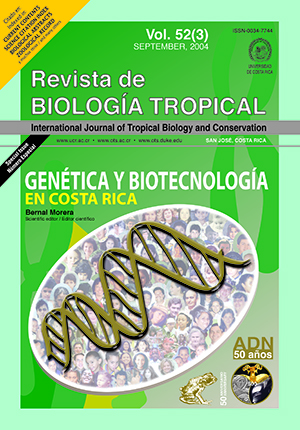Abstract
Cancer is a worldwide problem because of its high rates of incidence and associated mortality. By 2000, more than 6.2 million people died from this illness worldwide. Among all types of cancer, breast cancer is one of the most studied. Each year, one million new cases are diagnosed around the world. We can classify breast cancer into two main kinds: sporadic cases and those which are a product of inherited genetic alterations. Approximately 5-10% of breast cancer cases are the result of inherited mutations, or alterations in breast cancer susceptibility genes, BRCA1 and BRCA2. Like other countries, Costa Rica possesses high rates of incidence and mortality for breast cancer. According to the “Registro Nacional de Tumores” (National Office of Tumor Records), in 2000 breast cancer had the highest rate of incidence and in 2002 it had the highest rate of mortality in comparison to other types of cancer. For this reason and the generalized lack of knowledge in the field we conducted an epidemiological research on breast cancer patients from Hospital San Juan de Dios, San José, Costa Rica, to find families with a history of breast cancer, and to determine the occurrence of familial cases within the population studied. So far, we have found 23 families, within which we discovered very informative cases that have rendered the identification of a pattern of inheritance. These findings allow us to announce that in Costa Rica there are several cases of inherited breast cancer and that we need more research is needed to improve the prevention, control, and treatment of this disease.References
Anonymous. 2003. Breast Cancer Facts and Figures 2003- 2004. American Cancer Society. 23 p. (Also available online: http://www.cancer.gov)
Anonymous. 2004. Cancer Facts and Figures 2004. American Cancer Society. 56 p. (Also available online: http://www.cancer.gov)
Aguilar, M. 1999. Manejo de los estadíos I y II del cáncer de mama entre los años 1990-1998 en el servicio de oncología del hospital San Juan de Dios. Tesis de Licenciatura. Universidad de Costa Rica. San José, Costa Rica. 39 p.
Bartels Rodríguez, R., R.M. Vargas & G. Muñoz. 1999. Incidencia y mortalidad del cáncer en Costa Rica 1994/1996. Ministerio de Salud, San José, Costa Rica. 200 p.
Chen, C., N. Weiss, P. Newcomb, W. Barlow & E. White. 2002. Hormone replacement therapy in relation to breast cancer. JAMA 287: 734-741.
Eastson, D.F., D. Ford, T. Bishop & Breast Cancer Linkage Consortium. 1995. Breast and ovarian cancer incidence in BRCA1-mutations carriers. Am. J. Hum. Genet. 56: 256-271.
Friedwald., V., A. Buzdar & M. BoKulich. 1997. Cáncer de seno todo lo que usted debe saber. Grupo editorial Norma, Bogotá, Colombia. 158 p.
Haber, D. & E. Fearon. 1998. The promise of cancer genetics. Lancet 351: 1-8.
Hadjisavvas, A., E. Charalambous, A. Adamou, C. Chistodolou & K. Kyriacou. 2003. BRCA2 Germline mutations in Cypriot patients with familial Breast/Ovarian Cancer. Hum. Mut. 21: 171-175.
Lawrence, W., B. Peshkin, W. Liang, C. Isaacs, C. Lerman & J. Mandelblatt. 2001. Cost of Genetic counseling for BRCA1 and BRCA2 Breast cancer susceptibility Mutations. Can. Epidemiol. Biomak. Prev. 10: 475-481.
Llort, G., C. Yagüe, M. Peris, G. Blanco, J. Dermà, A Bale & M. Alvarez. 2002. Low frequency or recurrent BRCA1 and BRCA2 Mutation in Spain. Hum. Mut. 19: 307-313.
McPhearson, K., C. Steel & J. Dixon. 2000. Breast cancerepidemiology, risk factors and genetics. Brit. Med. J. 321: 624-628.
Peterson, E., K. Milliron, K. Lewis, S. Goold & S. Merajver. 2002. Health insurance and discrimination concerns and BRCA1/2 in a clinic population. Can. Epidemiol. Biomak. Prev. 11: 79-87.
Ruiz, P., O. Sinilnikova, M. Badzioch, A. Calderon, S. Chopin, O. Fabrice, J. Gonzáles, C. Szabo, G. Lenoir, D. Goldgar & H. Barrera. 2002. BRCA1 and BRCA2 Mutation Analysis of Early onset and familial breast cancer cases in Mexico. Hum. Mut. 20: 474-480.
Sierra, R., L. Rosero-Bixby, D. Antich & G. Muñoz. 1995. Cáncer en Costa Rica: Epidemiología Descriptiva. Universidad de Costa Rica, San José, Costa Rica. 87 p.
Wooster R., S. Neuhausen & J. Mangion. 1994. Localization of breast cancer susceptibility gene, BRCA2, to chromosome 13q12-13. Science 256: 2088-2092.
INTERNET REFERENCES
Anonymous, 2003. Global cancer rates could increase by 50% to 15 million by 2020. World Health Organization. 7 p. (Downloaded: February 04, 2004. http://www.who.com).
Márquez A. & R. Trujillo 1999 Cáncer de mama hereditario (I). MEDSPAIN. La nueva revista de Medicina y Salud en Internet (Downloaded: January 22, 2002. http://www.medspain.com/n6_nov99/cancer_mama 1.htm).
Márquez A. & R. Trujillo 1999 Cáncer de mama hereditario (II). MEDSPAIN. La nueva revista de Medicina y Salud en Internet (Downloaded: January 22, 2002. http://www.medspain.com/n7_nov99/cancer_mama 2.htm).
Comments

This work is licensed under a Creative Commons Attribution 4.0 International License.
Copyright (c) 2004 Revista de Biología Tropical


